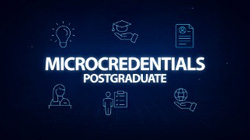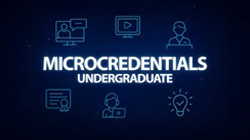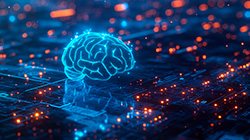What Are Microcredentials?
Microcredentials are short, targeted courses that help you learn specific skills quickly and efficiently. Unlike full degrees, they focus on one topic and are offered online.
When you complete a microcredential, you earn ECTS that you can add to your CV, LinkedIn profile, or digital portfolio. They’re a great way to boost your resume, explore career interests, or show employers that you’re proactive and ready to learn.
The online format allows for flexibility, making it easier to balance personal commitments and studies. The advanced e-learning platform provides access to lectures, educational materials, and interactive tools.
UNINETTUNO’s psycho-pedagogical model promotes active and participatory learning through tutor support, discussion forums, and practical activities, ensuring a high-quality educational path that meets the demands of the modern job market.
Three summary tables divided by faculty of the microcredentials available for postgraduate (Masters)
Each course is delivered online and lasts 8 weeks
| ENGINEERING | |
| Postgraduate | ECTS |
| Organizational and Management | 9 |
| Tunnelling | 6 |
| Economics of innovation | 9 |
| Corporate finance | 6 |
| Production Planning and Control | 9 |
| Modeling for Manufacturing Systems and Logistics | 9 |
| Information management systems | 9 |
| Digital innovation | 9 |
| Computer Systems Architecture | 9 |
| Networks services and security | 9 |
| Introduction to Big Data | 9 |
| Machine Learning | 6 |
| Big Data Platforms | 9 |
| Dynamics and seismic engineering | 9 |
| Automation of industrial processes | 9 |
| ECONOMICS | |
| Postgraduate | ECTS |
| ICT for the network organization | 9 |
| Digital technologies for business | 6 |
| Big Data and Database Management | 9 |
| International financial accounting | 9 |
| Marketing, e-business, e-commerce | 9 |
| Banking and financial law | 9 |
| Economics of Innovation | 9 |
| Public management and e-government | 9 |
| Advanced web technologies | 6 |
| Green economy e organizational behaviour | 9 |
| PSYCHOLOGY | |
| Postgraduate | ECTS |
| Social Psychology of Web-Based Relationships | 12 |
| Physiological and Pathological Neuroanatomy | 8 |
| Data Science | 10 |
| Methods of intervention in groups and organizations | 8 |
| Neuroscience and psychobiology | 8 |
| Clinical Neuropsychology | 8 |
| Psychotecnologies and Technopsychologies processes 2 | 8 |
| Principles of cognitive neuroscience | 6 |
| Neuropsychological assessment and cognitive neurorehabilitation | 8 |
| Science and Psychoanalysis | 8 |
| Principles of neurolinguistics | 4 |



